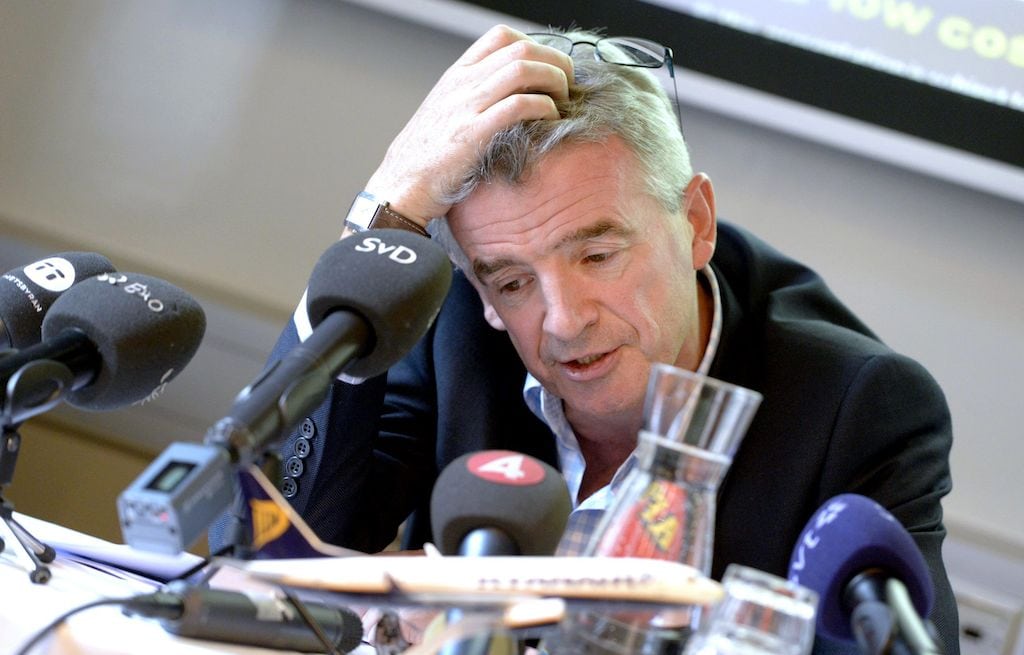Skift Take
Is the rise of Gulf carriers like an Internet bubble that will burst and reshape the trajectory of alliances, codeshares and aircraft purchasing economics? Ryanair's O'Leary is suggesting it may be, or at least that's his hope.
Ryanair CEO Michael O’Leary doesn’t think there is an attractive opportunity for the low-cost airline to operate transatlantic flights in the short term largely because Gulf carriers are buying so many aircraft as they expand that it is driving up the price to buy planes from Boeing and Airbus.
Contrary to earlier reports, the loquacious O’Leary did not shy away from playing an out-front role at the airline’s third quarter earnings call today, and said any transatlantic opportunity in the future wouldn’t be carried out by Ryanair, but perhaps by “some kind of sister company or some related company, but would never ever be Ryanair.”
Still, he sees aircraft buying sprees by carriers such as Emirates and Etihad as inflating the price for new aircraft, and quashing any opportunities for now.
“But the more you look at the backlog of Boeing and Airbus deliveries in long-haul and the crazy scale of the order book they have primarily from the Middle Eastern carriers, I think for the moment, I don’t see there being an opportunity to pick up a fleet at a reasonable pricing,” O’Leary said.
O’Leary also offered up some contrarian thinking, suggesting that the rise of the Gulf carriers may be merely a temporary phenomenon.
“But then bubbles burst and bubbles explode, and there’s an opportunity cropped up because one or others of the Gulf carriers didn’t make it over the next number of years, then that might emerge,” O’Leary said, referring to the possibility of transatlantic flights.
Wi-Fi Would Require a Transformation in Roaming Charges
In other news, O’Leary said he’s been “very committed” over the last four or five years to installing Wi-Fi on Ryanair planes, but roaming charges across “24, 25, 26” countries in Europe would make the service cost-prohibitive.
“I expect at some point in time in the next one, three, five years that somebody would invent some piece of case that transforms all those what are now high-roaming charges and will make Wi-Fi, onboard Wi-Fi at a relatively low cost — at relatively low — service that we can provide at very low cost to most of our passengers,” O’Leary said.
O’Leary added that low-cost Wi-Fi remains a “communication transformation away.”
Howard Millar, Ryanair’s CFO, said there is another obstacle to the implementation of Wi-Fi — the antenna.
“And in the kind of studies that we’ve done … is that there’s significant drag, potentially up to 2% additional drive for putting the antenna on,” Millar said.
Millar and O’Leary acknowledge that they would like to get Wi-Fi on their planes, but the expense remains an issue.
“And the way the antenna sits on top of the plane has to be made smaller so that you can reduce drag,” Millar said. “The 2% drag for us, just to put in perspective, will be potentially EUR 40 million ($54 million) a year of a hit and that’s not something we would be interested in doing.”
The Daily Newsletter
Our daily coverage of the global travel industry. Written by editors and analysts from across Skift’s brands.
Have a confidential tip for Skift? Get in touch
Tags: low-cost carriers, ryanair, wi-fi
Photo credit: Ryanair's CEO Michael O'Leary attends a news conference at the Scandic Grand Central hotel in Stockholm August 29, 2013. Bertil Enevag Ericson/Scanpix Sweden / Reuters
